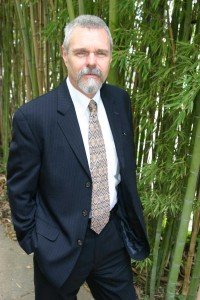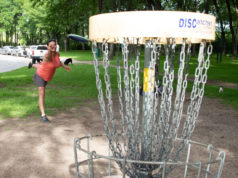Bob Crow is feeling pretty chipper these days. He’s lived next to Lake Worth since 1950, from the tail end of its glory days all the way through its many decades of neglect. The lake’s shiny new appearance coincides with its 100th anniversary, and Crow, along with neighbor Pat Hyer, are co-chairs of the Lake Worth Centennial Celebration.
“Our focus is to honor the past and preserve the future of Lake Worth,” he said. “In doing so, we’re highlighting the numerous recreational opportunities available at the lake.”
Begun in January, the yearlong celebration has already featured several lake parties with sailing regattas, a mountain bike rally, a boat parade, and a Blue Angels air show. Coming up next is a ski show on Sept. 20 and another regatta the following weekend. Crow’s committee of about 10 people spent two years planning it all. That’s the kind of commitment that Lake Worth residents are willing to give, and they’ll continue fighting to preserve the green space, Crow said.

“It would be a tremendous disservice to our children and grandchildren to permit any of that green space to ever be developed –– it’s irreplaceable,” he said. “It’s our generation’s responsibility to preserve this stuff for those guys. We’re crusaders. We’re watchdogs.”
For the longest time, however, the crusade has been led by Lake Worth dwellers. That worked well during the push for dredging. But this latest push to save the land could run out of steam without a citywide support system. Lake residents have much to gain by protecting the green space, particularly in quality-of- life issues and property values. They know that their pitches to protect the green space could be viewed with skepticism unless support comes from all over the city.
Now they’re looking to spread their grassroots base far beyond the lakeshore by joining forces with other environmentalists, including two local groups that have been focused on prairies (“Burning Passion,” July 30, 2014). The Fort Worth-based Great Plains Restoration Council has spent years attempting to protect and re-establish prairies from Mexico to Canada, including a 2,000-acre piece of land in south Fort Worth.
Don Young founded the nonprofit Friends of Tandy Hills Natural Area a decade ago to keep gas drillers away from that city-owned 160-acre park. Since then, the group’s annual PrairieFest has drawn thousands of residents to celebrate the joys of nature.
Young hasn’t been contacted by anyone about helping to save the Lake Worth property, but he’d welcome a call, he said.
“One of the things we say on our website mission statement is we want to protect and preserve Tandy Hills and all green space in North Texas,” he said. “We need it to help keep the air clean. That [Lake Worth property] is about five times bigger than Tandy Hills. I would imagine there are a lot of critters out there. We need those critters. They’re running out of places to go. To have an area that big protected is pretty critical, especially near the lake.”
And the iron is hot now, he said. The nonprofit Native Prairies Association, which has made major strides in saving grasslands in Texas in recent years, held its annual seminar in Fort Worth this summer. After that event, local residents created a Fort Worth chapter of the group.
The Native Prairies Association is a powerful group that can get things done, Young said. “They are compiling a list right now of all the properties in Fort Worth that they are going to study.”
Lake Worth’s location in West Fort Worth works against it, as the area is viewed by many residents in other parts of the city as already having more than its share of park space. Besides, Fort Worth leaders have proven over the years that they don’t get overly excited about large regional parks.
The city’s largest is the 3,600-acre Fort Worth Nature Center & Refuge. It’s on the West Side, not far from Lake Worth, giving critics ammo when explaining why the city shouldn’t dedicate another large park there. But the nature center and a Lake Worth park are hardly comparable. The nature center charges admission, and visitor access to much of the wildlife refuge is limited. The city’s second-largest park is the 500-acre Gateway Park just east of I-35.
The nonprofit Trust for Public Land, which is devoted to creating and improving neighborhood parks, analyzes and ranks the country’s largest 60 cities for park space. Currently, Fort Worth comes in at No. 40. Arlington, Dallas, Austin, and Corpus Christi all rank higher. About 5.5 percent of Fort Worth land is dedicated to parks, compared to 10.8 percent in Dallas and 7.7 percent in Arlington, according to the group’s analysis.
Carter Burdette, the former city councilman whose district included Lake Worth, favored the dredging but was never convinced that the city should preserve all that green space. He preferred to see a portion of the land sold and developed. The city’s parks funding was already stretched, and he liked the idea of reducing the burden by shedding some of the land and then capitalizing on the subsequent development.
“We already have a great deal of dedicated parks around the lake, and development is coming that way,” he told Fort Worth Weekly in 2010.
Back then he hesitated to officially designate the area as a park or even to call it that, because state law prevents such a mandate from being reversed without a citywide referendum.
Most of the existing parks around Lake Worth are small, with few improvements beyond a picnic table or two.
Burdette’s successor, Dennis Shingleton, is generally viewed as more open to preserving the green space, although he’s still undecided.
“When [Burdette] was looking at it, the lake was an entirely different place,” McGown said. “In working with [Shingleton] over the years, I’ve yet to see him shut the door on any possibility or discussion. I haven’t heard him say anything except, ‘Let’s make sure we do the right thing.’ ”
Crow shares that view.
“Dennis Shingleton has been a tremendous supporter of the lake,” he said. “I trust him to give us a heads-up if things are going in a bad direction.”
The Fort Worth-based engineering and planning firm Carter & Burgess did a study in 1985 that introduced the idea of either selling off part of the city-owned land or turning it into a park. The debate continues 30 years later.
The city council adopted a Lake Worth Vision Plan in 2011 that discusses future land use and development patterns. The plan calls for protecting and enhancing water quality and natural beauty but also for developing sustainable communities. The devil is in the details, and nobody is hurtling toward a decision. The committee that is studying the land meets once every two months. McGown thinks another year or two will pass before city officials decide whether to develop or protect the land.
“We have the time to study it and to do what we still do pretty well in Fort Worth –– sitting everybody around a table and saying, ‘What are all the possibilities?’ and ‘Let’s come up with an idea,’ ” he said.
The current bunch of elected officials gives him hope as well.
“We have a mayor who likes to be outside; she gets it,” he said. “[Shingleton] has been a wonderful representative. We’re not starting from scratch.”












Carter Burdette… He’s a piece of work. His support of fracking helped place a few thousand gas wells in the city and removed thousands of acres of green space for a known health and safety hazard; He got his stretch of Camp Bowie bricks whose year round maintenance costs taxpayers a bundle. Yet he still thinks we need more development in what little green space remains in FW. I say, screw him. Council needs to do the right thing and save what’s left for the wildlife and nature mystics.
Don, without Carter Burdette’s support and counsel regarding tactics for presentations to City Council and studies to support the requests for funding, I don’t think this lake would have been dredged today.
I definitely disagree with his beliefs regarding future use of city-owned undeveloped green space around Lake Worth. But he disagrees with mine….Still, all things considered, Councilman Carter Burdette was a strong and positive force for dredging and reclamation of Lake Worth.
I respect him for his work on that. But it’s in the past.
Now, we must go forward and encourage preservation efforts…and do that in a professional, balanced and effective way. At least that’s the way I see it. I agree that we have a fabulous opportunity here and should not squander it.